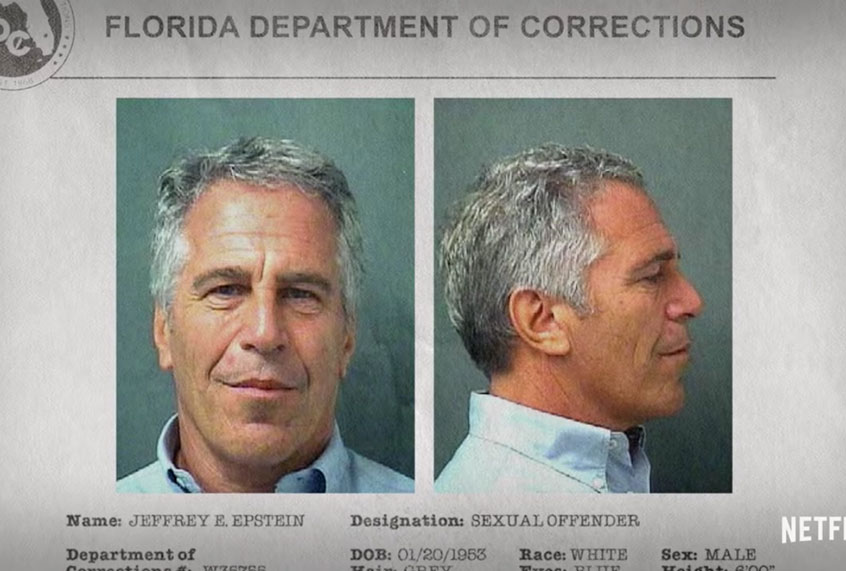While “Jeffrey Epstein: Filthy Rich,” Netflix’s new docuseries, is obviously, in part, a survey of its infamous subject, it becomes immediately apparent that this story really belongs to the survivors of his sexual abuse. For four hours, you’re confronted with sickening detail after detail from a parade of very brave women (who are all rightly credited as “survivors” in their introductions) as they relive some of the worst experiences of their lives.
Epstein’s abuse of at least 36 underage girls was simultaneously calculated and casual – a pattern emerges as to whom he groomed and how he abused them — but for these women, it was life-shattering.
“Before Epstein, I was . . . I was . . . something else,” one survivor explains. “The way I saw myself a long time ago was like this flower, a flower that was opening up. And afterwards, it was like somebody just picked up that flower, plucked it from its roots and stomped on it and smashed it.”
It’s obviously imperative that in any telling of Epstein’s story these accounts be centered, but it’s a move that, in the hands of director Lisa Bryant, is more successful in theory than in practice for the purposes of a docuseries.
The pacing of “Filthy Rich” starts and sputters, occasionally ramping up into high gear when we hear from the detectives who worked the case. But there’s no investigation to further most details that emerged prior to and following Epstein’s death by suicide in 2019, no real reflection on why Epstein was so readily embraced by the financial and political elite.
Instead, “Filthy Rich” often slips into a kind of nauseating rhythm of victims recounting horrific abuse, present-day interviews with the prosecution and the defense in the Epstein trials, and quick cuts to insights from journalists, law enforcement, and adolescent sexual psychologists. Think of it, almost, as an especially plodding four-hour edition of “Dateline.”
The only times we hear from Epstein are in a smattering of deposition clips, in which he invokes his Fifth Amendment rights in answer to nearly every question, and in a single radio interview. To be clear, I’m not bothered by this — there are many, many examples of solid documentaries made about people whose voices aren’t featured — but in these cases, filmmakers need to get creative to prevent an endless procession of talking-head interviews.
Granted, there are interesting talking heads (like novelist James Patterson, who was Epstein’s neighbor in Palm Beach, co-authored the 2016 book “Filthy Rich,” and executive produced this docuseries), but that’s the territory we lapse into in “Filthy Rich,” which also highlights a nagging issue with the series.
Multiple interviewees describe Epstein’s “Svengali-like” sway over everyone in his professional and social path, positioning him as a kind of enigmatic manipulator who had the uncanny ability to convince even the most powerful people to succumb to his demands. This is totally at odds with the footage we see of a slovenly Epstein, whom “Vanity Fair” journalist Vicky Ward describes as a man who couldn’t be bothered to dress himself correctly or be seen in restaurants.
There are assertions as to how he may have established some of that power — like by potentially instigating a sexual relationship with L. Brands CEO Leslie H. Wexner — but these are either mentioned in passing or incompletely investigated. It’s stated multiple times that various turns in his life were unprecedented, from his professional ascent to the “get out of jail free card” plea deal he entered in 2008, but the inner workings of these aren’t interrogated in a way that spotlights much new information.
Where the series starts to pick up again in a meaningful way is in the third episode, in which we hear from Steve Scully, a former Epstein employee who worked on his island off the coast St. Thomas, who details some of the guests he saw on the island. He alleges he saw Alan Dershowitz there for a business meeting; Bill Clinton on the island with no other guests; and Prince Andrew near Epstein’s pool, engaging in foreplay with a young, topless girl.
There are no additional corroborating reports, but the series had already established that many prominent people in power were at least familiar with Epstein’s predilection for underage women. At one point, a quote from Donald Trump is transcribed on screen: “I’ve known Jeff for fifteen years. Terrific guy . . . he likes beautiful women as much as I do, and many of them are on the younger side.”
Why, then, was he allowed to hold such prominent financial and social positions for long? One of the survivors, Sarah Ransome, details a scene that seems to serve as a metaphor for how the world at large approached Epstein. She remembers one night that Epstein started having “hardcore sex” with a young woman in front of house guests, all of whom either looked away feigning distinterest or pretended they were asleep.
This pattern repeated throughout Epstein’s life of other powerful people turning a blind eye to the mounting accusations of his sexual abuse of minors. “Jeffrey Epstein: Filthy Rich” reiterates this case over and over, but misses several opportunities to understand how, why and what can be done to prevent it from happening again. Perhaps it was simply because he had enough power and money to threaten them in meaningful ways, or perhaps it was something even more sinister — but in the absence of that information, the docuseries is serves as a haunting showcase of his survivors.
“Jeffrey Epstein: Filthy Rich” is currently streaming on Netflix.


